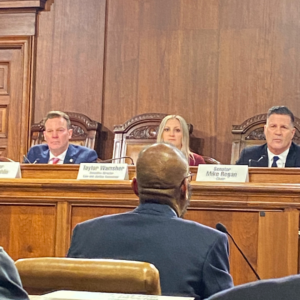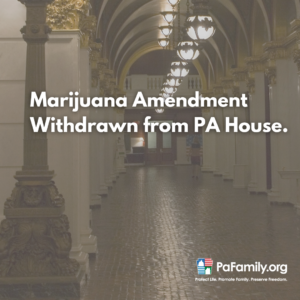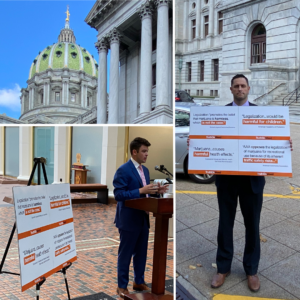Medical experts share evidence of states experimenting with marijuana legalization for recreational use seeing more health harms
As some PA lawmakers push for Pennsylvania to commercialize the retail sale of high-potency marijuana for recreational use, what can too often be left out of the discussion is evidence from medical experts on the risks with marijuana use and the problems with legalization, especially with children.
On June 13, a panel of physicians and psychiatrists from Children’s Hospital of Philadelphia (CHOP) explored some of the dangers of marijuana and youth. The evidence presented spoke unequivocally: marijuana endangers children, legalization brings more threats through commercialization, and frequent use imperils mental health.
1. Endangering Children
There has been a dramatic increase in marijuana-related calls to CHOP’s Poison Control Center, which has seen a call increase of 1200% in the last four years.
In 2015, CHOP received four calls involving a child and marijuana exposure from Pennsylvania and Delaware. In 2019, that number rose to 27. In 2023, it ballooned to 332 calls.
The continued rise in these poison control calls in 2024 is “bigger than ever” says Dr. Kevin Osterhoudt, attending physician in CHOP’s emergency department and medical director of The Poison Control Center at CHOP. He delivered a stark assessment of the impact that increased access to cannabis products is having on Pennsylvania’s youth.
“Every single day, we are getting a call from Pennsylvania and Delaware about a child under the age of six who has become exposed or injured in some way by THC products,” stated Dr. Osterhoudt.
But why the dramatic increase in calls? Although a variety of factors are influencing the trend, Radha Pennotti (MPH), policy and strategy manager for CHOP’s PolicyLab, noted the unmistakable reality that marijuana today is more accessible, more potent, and, thus, more likely to cause harm to children. “This rise in ingestion of THC is in part due to the increased availability and potency of products containing THC and limited state activity related to safeguards to protect children.”
The medical repercussions of young children interacting with marijuana don’t stop at a phone call. As Osterhoudt highlighted, between 5% and 25% of children contacting poison control due to marijuana are hospitalized in intensive care units, 1% to 10% are put on ventilators, and many experience “movement-like disorders that people are calling seizures, comas, and many other health effects like that.” Respiratory depression and myocarditis in children are also frequently linked to high THC exposure.
It’s worth noting, Delaware legalized their experiment with marijuana legalization for recreational use in 2023. While Pennsylvania has pushed back on retail recreational sales, the state’s medical program has a variety of problems, from no potency caps on products to doctors profiting from issuing thousands of medical cards with no recommendations on specific products or dosages.
2. Commercialization = Increased Youth Use of Marijuana
Dr. Jesse Hinckley, assistant professor at the University of Colorado School of Medicine and practicing child and adolescent psychiatrist, identified how the dual effects of the prevalence and potency of marijuana through legalization threaten brain development.
“When we are talking about cannabis in particular,” said Hinckley, “the big thing that concerns us with adolescents is brain development. You get one shot at that. The potential impact on brain development is the biggest risk.” The brain continues developing until age 25; therefore, Hinckley argued, policymakers should examine the prevalence of marijuana use across a range of ages when considering marijuana legalization.
Evidence shows individuals aged 18 to 25 increase their use of marijuana when it is legalized. “When you look at the 18-25 year old population, who are still going through brain development, the prevalence rates among those at that age group is increasing and has increased sharply,” noted Hinckley. “The rates of increase are higher in states with recreational marijuana laws than states without.”
Legalization not only increases the prevalence of use among those with developing brains, but it also incentivizes increased potency of marijuana products. “One of the greatest impacts of legalization is commercialization, and when you commercialize something, you have an ability to produce it and, for lack of a better term, produce a higher quality product,” Hinkley explained.
“There is this perception that the higher the concentration of THC, the better the product.”
Legalization in Colorado transformed marijuana into a highly potent product. As Hinkley detailed, “We went from having products that, on average, were 4 to 8% THC for blunts in Colorado now to 25%. Concentrates that used to be between 30 and 40% are now routinely 95% THC. That’s a huge difference in terms of what youth have access to.”
3. Mental Health Problems
Marijuana use is leading to more mental health problems. On this webinar, Dr. Frank P. James, medical director of the Substance Use and Addiction Services Program Development in the Department of Child and Adolescent Psychiatry and Behavioral Sciences at CHOP, highlighted the disastrous mental health impact of vaping marijuana products – an impact that is “much more concerning that the effects of nicotine and probably both alcohol and opiates.”
Beyond physical respiratory issues, Dr. James noted that vaping marijuana frequently leads to an “increase in schizophrenia, a decrease in the ability to pay attention, increased impulsivity, including a rise in risky behaviors and dangerous and violent behaviors, and effects on IQ and cognition.” Marijuana addiction, a substance use disorder, may “cause disinhibition and often lead to harmful consequences like driving under the influence,” as Dr. James further explained.
Discussing the mental health implications of high-potency THC, Dr. Hinckley also sounded the alarm. “When we look at the data, there are some unique signals around psychosis and around suicidal ideal and suicidal attempt in youth that are particularly concerning.”
Daily marijuana use is at an all-time high, now outpacing daily alcohol use in the United States. Repeated use of marijuana in adolescents, a documented result of legalization in other states, presents a grave threat to overall mental health.
The facts shared from CHOP’s recent roundtable paint a troubling picture. Increased exposure to THC products is harming kids. Higher THC potency and prevalence due to the legalization of the retail sale of marijuana for recreational use is a public health and safety concern, harming more children and causing more mental health disasters.
Pennsylvania lawmakers, please take note.
Take Action
Contact your State Senator and State Representative and ask for their NO vote on any bill that would harm PA communities through marijuana legalization. Click here to email your elected officials.






Thank you for sharing this valuable insight. This helps to affirm what I have suspected is going on “behind the scenes”. Unfortunately, the general public does not see or even consider the damaging effects of drug use in all it’s forms, especially upon children. Please keep pushing the truth into the public eye through newspaper and electronic medias. Thank you.